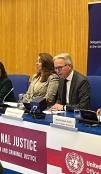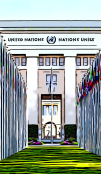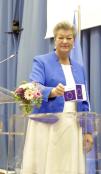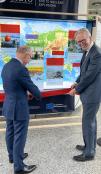Side event NPT: Perspectives on the Middle East WMD-Free Zone
On the margins of the First Preparatory Committee for the 2026 Review Conference of the Parties to the Treaty on the Non-Proliferation of Nuclear Weapons (NPT), the EU together with the United Nations Institute for Disarmament Research (UNIDIR), organised an event entitled Perspectives on the Middle East WMD-Free Zone. The event was held in a hybrid format and attracted over 100 participants, attending both online and in-person.
The aim of the event was to present the EU-funded UNIDIR project, and specifically to showcase the activities and achievements of Phase 1 and to introduce Phase 2 of the project, which will last additional three years. Opening remarks were delivered by the EU Special Envoy for Non-proliferation and Disarmament, followed by a presentation by the UNIDIR Project Head and a discussion with three high-level panelists.
In her statement, Special Envoy Marjolijn van Deelen from the European External Action Servce (EEAS) reiterated the EU’s long term commitment and support to the establishment of a zone free of weapons of mass destruction in the Middle East (ME WMDFZ). She emphasised that the proliferation of weapons of mass destruction and their delivery systems remain a matter of grave concern to the EU. Furthermore, she highlighted the need to enhance dialogue and cooperation between Middle Eastern States in order to make progress towards a zone based on arrangements freely arrived at between all States of the region.
Dr, Chen Zak Kane from UNIDIR elaborated on the objectives and outcomes of the first phase by highlighting key publications and a large number of events organised, both at the national and regional level. She furthermore introduced the next phase, which will assist in mitigating regional WMD proliferation trends, encourage regional security arrangements and arms control, non-proliferation and disarmament norms and processes, develop a more in-depth understanding of the relationship between the ME WMDFZ and current regional and international developments, and promote an effective, verifiable, inclusive, and sustainable ME WMDFZ.
Three high-level speakers - namely Director Bassem Hassan from the Ministry of Foreign Affairs of Egypt, Ambasador Jeanne Mrad of Lebanon in New York, and Ambassador Adam M. Scheinman, Special Representative of the President of USA – presented their views on the project. They appreciated the EU’s initiative and the work conducted by UNIDIR and shared their perspectives on the UN Conference on the Establishment of a Middle East Zone Free of Nuclear Weapons and other WMD.
Background
In August 2019, with the support of the EU, UNIDIR launched a project to examine the past, perspectives and prospects of the ME WMDFZ. The first phase of the project had four objectives:
- Filling important reseach gaps related to how the issue of a ME WMDFZ has evolved over time, including lessons for current activities and future prospects.
- Building analytic capacity to support new thinking on regional security issues and a Zone, including drawing lessons from the establishment of other nuclear-weapon-free zones.
- Collecting ideas and developing new proposals on how to move forward in this issue.
- Fostering inclusive dialogue among experts and policymakers on regional security issues and the Zone, which in turn could contribute to ongoing multilateral and regional processes.
For more information on the UNIDIR project, visit https://unidir.org/programmes/middle-east-weapons-mass-destruction-free-zone.
EU Council Decision of 26 June 2023 in support of a project on a zone free of weapons of mass destruction in the Middle East in an evolving regional security environment:
https://eur-lex.europa.eu/legal-content/EN/TXT/PDF/?uri=CELEX:32023D1306





